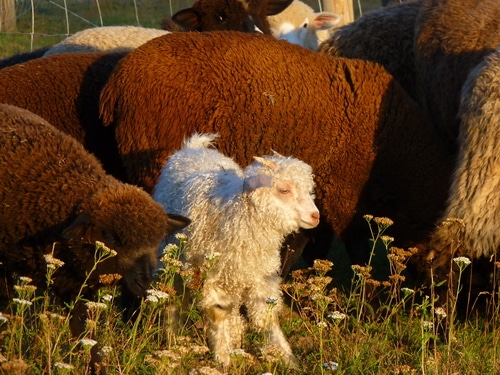Herbal Remedies for Common Pet and Livestock Ailments
I’m not a veterinarian but I’ve used herbal medicine for my pets and livestock ailments for more than a decade. Check out the full article on the Frugally Sustainable Blog.
I am so totally excited. I’m guest posting today on Frugally Sustainable, one of my very favourite places in the blog-sphere. While herbs can be helpful for our critters, sometimes we need to make adjustments because we have health challenges. Allergies can be triggered by our animals food, here’s an option for gluten free fish food, since feeding pets shouldn’t make you sick too.

Here’s an excerpt:
…Although I am not a veterinarian, I have used herbal medicine for my pets and livestock ailments for more than a decade. I offer these recommendations as a neighbour, not as a professional herbalist. To treat specific diseases contact a reliable veterinary herbal, such as The Complete Herbal Handbook for Farm and Stable by Juliette de Bairacli Levy, or your holistic veterinarian.
The Complete Herbal Handbook for Farm and Stable
Home-based Medicine for pets and livestock ailments
While many of us want to bring home-based, herbal medicine to our families, we hesitate to offer the same level of care for our pets and livestock ailments. This isn’t because of a lack of willingness, but rather because we don’t know-how. The situation is complicated because animals are not simply humans with four legs. And what works for one species may not be helpful for another. Some medications that one might use on humans may be toxic to an animal – Tea Tree for instance is beneficial to humans being antiviral, and antibiotic, but it is toxic to cats and rabbits. So when making an herbal salve for rabbits, you would substitute lavender, a less toxic essential oil, in order to fight infection.
The good news is that by learning about herbs and their beneficial effects, you will be knowledgeable about a wide variety of herbs and be able to make wise substitutions in any herbal recipe. In this way, you will be able to make specific remedies for your pets and livestock ailments, based on herbs growing in your neighbourhood or herbs available through your local health food store or online.
Herbal treatments often require a longer application than veterinary medicine, weeks instead of days, however, herbs can often cure an ailment, where veterinary medicine only suppresses the symptoms. So if a problem isn’t cured in a day or two, with herbal treatment, but the animal is comfortable, you may only need to persist to gain a complete cure. In an emergency situation, don’t hesitate to contact your veterinarian, herbal remedies can be an adjunct to conventional treatments, as well, and sometimes it is wise to use antibiotics or chemical wormers in the short term to alleviate an acute infection or infestation, while you work with herbs to support the animal’s immune system and heal the underlying condition.
Check out my article on Herbal Medicine for Pet and Livestock Ailments on the Frugally Sustainable Blog and leave a comment for Andrea, so that she knows you were there.
Other resources:
The Complete Herbal Handbook for the Dog and Cat
Complete Herbal Reference Library
Common Herbs for Natural Health (Herbals of Our Foremothers)
The Illustrated Herbal Handbook for Everyone
Back to You:
How do you deal with common pet and livestock ailments? What’s your first herbal go-to when an animal that you love has a problem?



Leave a Reply